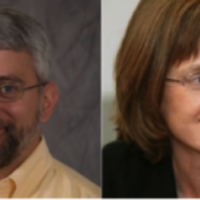Expanding the Pipeline: The National GEM Consortium Shines a Bright Light on Graduate Education and Retention
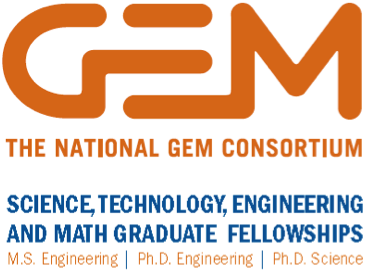 About the National GEM Consortium (@GEMFellowship)
About the National GEM Consortium (@GEMFellowship)
GEM is a network of leading corporations, government laboratories, universities, and research institutions that enables qualified students from underrepresented communities to pursue graduate education in applied science and engineering. Its mission is to enhance the value of the nation’s human capital by increasing the participation of underrepresented groups—namely, African Americans, Native Americans, and Hispanic Americans—at the master’s and doctoral levels in engineering and science. GEM recruits high-quality underrepresented students seeking to pursue advanced degrees in applied science and engineering, and matches their specific skills to the specific technical needs of GEM employer members. The average GPA of GEM students exceeds 3.5, and more than 80 percent of students accept full-time offers from sponsoring employers. Founded in 1976 at the University of Notre Dame, GEM has graduated more than 4,000 researchers, professors, entrepreneurs, inventors, and business leaders, including more than 400 individuals with doctorates in the physical sciences, life sciences, and engineering.
GEM’s signature GEM GRAD Labs workshops encourage students to pursue graduate school and are held at partner universities across the country. The GEM fellowship program provides fellows with full tuition, fees, and an annual stipend. The window to apply for GEM fellowships runs from July 1 to November 15 each year. Click here to view upcoming events.
Get Involved
Please encourage undergraduate students to visit a GEM GRAD Lab in their area, consider hosting an event on your campus, or join GEM as an industry employer. The National GEM Consortium was able to fund only 150 GEM Fellows this year, which left more than 800 highly qualified applicants without funding. Your support and advocacy for these students is critical to creating a talented, diverse, and inclusive workforce to meet 21st century challenges.
2016 GEM Conference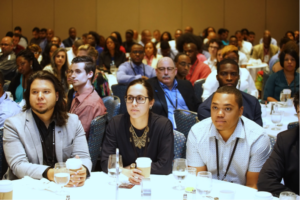
The 40th Annual GEM Conference (hashtag #GEM40) was held in Miami Beach, Fla., from August 3-5, and was a resounding success, with more than 300 attendees. The conference is a prestigious forum for stimulating debate on bold solutions to advance graduate education, and it creates a platform to raise nationwide awareness of GEM’s mission, partners, and fellows. This is the “must-attend” event for those who want to transform how the U.S. educates and prepares engineering and science talent for advanced leadership careers, particularly among our nation’s native-born, historically underrepresented ethnic groups.
The conference provided a tailored set of tracks for attendees and a technical presentation competition and poster session for students. The University of Florida, Florida International University, and University of South Florida, all of which GEM University are sponsors, shared their impressive statistics on the production of B.S., M.S., and Ph.D. degrees. Host Eric Evans, director of MIT’s Lincoln Laboratory, shared his intern cohort success and commitment to its continuation, and showed an entertaining video featuring GEM interns in Carpool Karaoke.

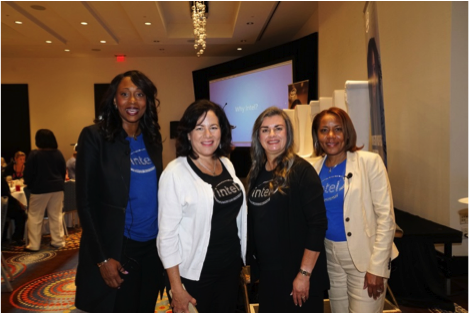
The breakfast plenary, sponsored by Georgia Institute of Technology, featured a panel of distinguished Georgia Tech GEM alumni. Moderated by Georgia Tech’s Dean of Engineering, Gary May, panelists included Johney Green Jr., National Renewable Energy Laboratory; LeShelle May, CNN; and Linda Jordan, a financial services executive, all of who shared insights about their career paths and the importance of the GEM program as foundational to their professional success. The lunch plenary, “Breaking the Glass Ceiling: Women in Senior Technical Roles,” featured a “keep it real” session with leaders from Intel, GEM’s largest employer sponsor. Barbara Whye served as moderator and the panelists included Lakecia Gunter, Joan Tafoya, and Patty Lopez.
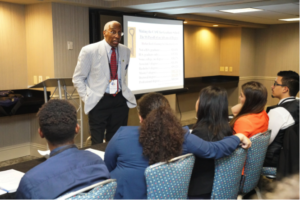
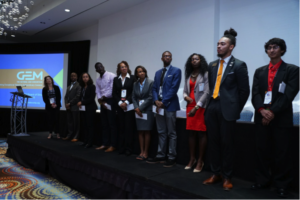
Among the conference highlights was a “The Importance of Mentoring” workshop by Howard Adams, GEM program consultant and founding executive director. Adams shared stories about his humble background, his work ethic, how he found mentors, why one needs different types of mentors, what a STEM career can offer, various life lessons, and advice for realizing your potential. His comments included, for example: “If you think math is hard, try paying your bills without any money. That’s hard! Ask yourself: How am I using my time? Where am I using my energy? What return am I getting on my effort?” For Ph.D. students who were in their final, exhausting year, he said, “You can’t be tired getting a Ph.D. Look at me–I’m 76 years old!” A student from the back of the room shouted, “You look good!” and the room erupted with laughter.
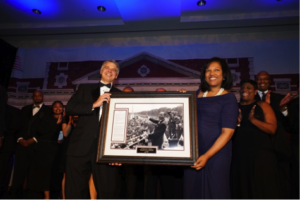
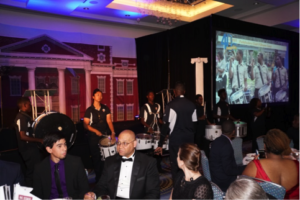
The conference featured a gala dinner, which provided a history of GEM from 1976 to the present day. The gala dessert reception and after party with MCs and a community-based drum squad was followed by dancing. GEM honored departing CEO and executive director Michele Lezama for her years of dedicated service with a framed photograph of Martin Luther King, Jr.
About the Authors
Patty Lopez, Ph.D., is a senior platform applications engineer at Intel Corporation, working with customers to deliver Xeon server chip solutions that power high-end data centers and mission-critical applications. Prior to joining Intel in 2008, she spent 19 years as an imaging scientist for Hewlett-Packard, creating and transferring technology in imaging into scanner, camera, and all-in-one products. Lopez has released more than 50 products and holds seven imaging patents. She earned her B.S. (with honors), M.S., and Ph.D. in computer science from New Mexico State University. Her research interests include CS education, e-textiles, and wearable computing. Lopez is also the column editor for Expanding the Pipeline in Computing Research News.
Shameeka Emanuel’s career spans 11 years at Intel Corporation. After completing her B.S. degree in systems and computer science at Howard University and her M.S. in computer engineering from North Carolina State University where she was selected as an Intel MS GEM Fellow, Emanuel joined the company. She spent most of her career within Intel’s server design group where she worked to validate four processors in the Xeon product family. Currently, she is the diversity scholar program manager where she is responsible for driving diversity technical pipeline program strategies and maintaining relationships in the communities with organizations chartered and/or focused on developing and growing diverse technical talent.
Carnegie Mellon University sponsored the technical presentation and poster competition, and recognized the winners during the closing awards ceremony. The winners, along with their institution and GEM employer sponsor, are listed below:
Master’s and 1st Year Ph.D.-Level Students:
1st Place: Adrienne Sands, 2015 GEM Ph.D. Fellow, University of Minnesota, Adobe Systems, Inc.
2nd Place: Tenell Rhodes, Jr., 2015 GEM M.S. Fellow, Drexel University, Adobe Systems, Inc.
3rd Place (Tie): Abisola Kusimo, 2016 GEM M.S. Fellow, Stanford University, Oak Ridge National Laboratory, and Dominic Bednar, 2015 GEM M.S. Fellow, University of Michigan, Oak Ridge National Laboratory2nd Year and Beyond Ph.D.-Level Students
1st Place: Stefany Holguin, Ph.D. student, Georgia Institute of Technology
2nd Place: Adewale Odukomaiya, 2013 GEM M.S. Fellow, current Ph.D. student, Georgia Institute of Technology, Oak Ridge National Laboratory
3rd Place: Loretta Cheeks, 2013 GEM Ph.D. Fellow, Arizona State University, Adobe Systems Inc.Poster Competition Winner: David Garcia, 2015 GEM Associate Ph.D. Fellow, University of Tennessee-Knoxville
The conference featured the following tracks:
University track: The nuts and bolts of naming, selecting, and funding GEM Associate and University Fellows, recruiting best practices through GRAD Lab, and other opportunities
Employer track: Sponsorship structure for GEM Fellows, optimizing the selection process, networking session with GEM employers
Alumni track: Speaker bureau training (presence and testimony to foster the next generation), how to conduct mock interviews, and the importance of mentoring
Undergraduate track: GRAD Lab: Students learn why they should choose graduate school, how to apply, and how to fund it
Graduate (M.S. & Ph.D.) track: Degree-specific best practices for preparing for academia or industry, networking for career success, bouncing back from setbacks, and a discussion of the unspoken rules of being a Ph.D. student








